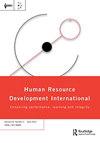南非公立高等教育机构、大学研究成果以及对国家人力资本的贡献
IF 3.8
Q2 MANAGEMENT
引用次数: 3
摘要
摘要本文运用本质主义和人力资本理论,认为南非公立大学应为国家人力资本的生产和发展做出贡献。它还利用研究产出绩效、学术人员配置以及对数学和工程等关键科学领域的知识贡献来证明南非公立大学在过去15年中取得的进步微不足道。本文推断,这些公立大学在国家劳动力市场和经济需要的特定科学领域没有对国家人力资本发展做出显著贡献。相反,南非公立大学相对更大的贡献仍然是在社会科学和人文学科,而国家发展需要注册会计师、医生和工程师。本文得出的结论是,所有这些失败都可以通过渗透到南非公立高等教育部门领导层的政治和富有远见的赤字来解释。作为一项建议,该文件指出,补救措施只能从将公立高等教育部门从执政党和政府政治中解放出来开始,这将使大学领导层获得必要的“学术自由”,以确保这些机构专注于本质主义方法。本文章由计算机程序翻译,如有差异,请以英文原文为准。
South Africa’s public higher education institutions, university research outputs, and contribution to national human capital
ABSTRACT This paper uses essentialism and human capital theory to argue that South Africa’s public universities are expected to contribute towards the production of national human capital and development. It also uses research output performance, academic staffing profile, and knowledge contributions to critical scientific fields such as mathematics and engineering to demonstrate that South Africa’s public universities have made negligible progress over the past 15 years. The paper deduces that these public universities have not made noticeable inputs to the national human capital development in the specific scientific fields, which the national labour market and economy needs. Instead, South Africa’s public universities’ relatively greater contribution has continued to be in social sciences and humanities when national development required chartered accountants, medical doctors, and engineers. The paper makes a conclusion that all these failures are explicable through the politics that have infiltrated the leadership of South Africa’s public higher education sector and the visionary deficits. As a recommendation, the paper notes that remedial measures can only start with the extrication of the public higher education sector from the ruling party and government politicking, which would allow university leadership the necessary ‘academic freedom’ to ensure that these institutions focus on the essentialist approaches.
求助全文
通过发布文献求助,成功后即可免费获取论文全文。
去求助
来源期刊

HUMAN RESOURCE DEVELOPMENT INTERNATIONAL
MANAGEMENT-
CiteScore
11.40
自引率
11.10%
发文量
43
期刊介绍:
Human Resource Development International promotes all aspects of practice and research that explore issues of individual, group and organisational learning and performance. In adopting this perspective Human Resource Development International is committed to questioning the divide between practice and theory; between the practitioner and the academic; and between traditional and experimental methodological approaches. Human Resource Development International is committed to a wide understanding of ''organisation'' - one that extends through self-managed teams, voluntary work, or family businesses to global enterprises and bureaucracies. Human Resource Development International also commits itself to exploring the development of organisations and the life-long learning of people and their collectivity (organisation), their strategy and their policy, from all parts of the world. In this way Human Resource Development International will become a leading forum for debate and exploration of the interdisciplinary field of human resource development.
 求助内容:
求助内容: 应助结果提醒方式:
应助结果提醒方式:


